Network better
Jeremy Marchant

First published in Great Britain by Practical Inspiration Publishing, 2018
Jeremy Marchant, 2018
The moral rights of the author have been asserted
ISBN 978-1-78860-053-8
All rights reserved. This book, or any portion thereof, may not be reproduced without the express written permission of the author.
Every effort has been made to trace copyright holders and to obtain their permission for the use of copyright material. The publisher apologizes for any errors or omissions and would be grateful if notified of any corrections that should be incorporated in future reprints or editions of this book.
Givers Gain is a registered trade mark of Asentiv (formerly the Referral Institute) and of BNI, and used with kind permission.

Contents
I Fundamentals
Introduction
In the beginning
Story: Maggie (1)
Maggie was one of two directors of a small business. The directors knew that business networking was an important part of their strategy for growing the business, but only Andy actually did any.
As a business, they needed more clients, and they needed their services to be more widely known in the local community. They both recognised that Maggie should network with other businesses.
It quickly became apparent that Maggie was highly resistant to the idea. She agreed she should do it. Deep down, she wanted to do it. But the idea of walking into a room full of people she didnt know filled her with little short of terror.
Maggie is the inspiration for this book. As Maggie and I talked about what her reservations were, and how realistic they were, she was identifying the problems that many people have when it comes to business networking.
We had quite a long chat, during which we uncovered that her real reservations were not those on the surface.
As Ill show later, when we want to change our behaviour in any part of our lives, we need to change the beliefs and feelings we have about that behaviour. If we dont change those beliefs and feelings, its not really surprising that the old behaviour persists.
We create our feelings and beliefs about the world from our experiences of it. The best way of changing our beliefs and feelings, therefore, is to have new experiences. So, I suggested to Maggie that she go to a particular event in a week or sos time. I knew this event would be laid back to the point of being horizontal. It would be the least stressful business networking event one could possibly imagine.
Because she is an honourable woman, I knew that if she said she would go, she would. So I made sure I didnt leave her office until she had undertaken to grasp the nettle.
Later, I had a word with the organiser of the event. I asked him to do as much as he could to make Maggies experience as stress-free as possible. He promised to look out for her and to introduce her to some people.
I also discovered that a business colleague intended to go to the event and asked her to look after Maggie too. I knew my colleague would make an effort to ensure Maggie met some people and shed support Maggie.
I was unable to go to the event myself. Later, I had some feedback from my co-conspirators who reported that Maggie had attended and had been very nervous. But she stayed the course. And, naturally, as soon as she had done it once, she knew she could do it again.
We shall catch up with Maggie in the last topic of this book.
There will be some people reading this who need do no more than put the book down, sally forth with Maggie in mind, remembering the advice the witches gave Macbeth
Be bloody, bold, and resolute
Be lion-mettled, proud.
and get on with it. For those needing a little more detail, the rest of this book beckons.
Your objectives in networking
This book starts with Maggie, her fears and experiences, and how, at the end of the day, she became a demon networker.
But really it is about you, with your experiences. Its about how you can get more of whatever it is you want to get from networkingwithout necessarily spending any more time or money. It is about doing it differently and doing it better.
I must stress that, although I home in on the networking event as the forum in which you talk about your business, its products and services, and yourself, everything in the book is relevant in whatever context you are talking to others.
It is remarkably difficult to get what you want if you dont know what you want. And, even harder when you realise that what you should be aiming for is not what you want. Its what your business needswhich may not be what you personally want. The obvious example is that what your business needs you to do is to network well with other business peoplesomething you may be reluctant to do.
To start with, I suggest it is really worth thinking about your objectives. Although what you want is interesting to you, it is a snare and a delusion. The important questions are: What do you need? and what does your business need (you to do)?
For most business people, the primary objective of networking is to get more clients. But it could be many other things, such as research, looking for a business partner, or just socialising (running a one-person band can be lonely). It may even be to look for a supplier!
This book is for you if you are a business person at a networking event needing more clients. Its equally for you if:
 you are networking internally in a large organisation
you are networking internally in a large organisation
 you work in the public sector, where networking is a dark art from which riffraff like me are usually excluded
you work in the public sector, where networking is a dark art from which riffraff like me are usually excluded
 you are in the third sector where networking is often about finding donors, both of money and time.
you are in the third sector where networking is often about finding donors, both of money and time.
There is nothing that is specific only to small and medium-sized businesses (SMEs), or the public sector, or charities or anyone else. It all applies to everyone at work.
Ultimately, my objective is to convince you that networking is all about the quality of the relationships we have with other people.
Does the world really need another book on business networking?
There is a plethora of books on the subject, yet I believe this book addresses two areas that are not usually covered well, or at all, in books on business networking.
Firstly, it considers how to use our emotional intelligence (EI) best when networking. Most books on networking are strictly behavioural. Do this, do that. This is necessary, for sure, but it isnt sufficient. After all, business networking is about relating to people. It is only about relating to people, in fact. For most business people, it is the only activity that solely relies on their capacity to form and nurture relationships with other people in order to be successful.
In networking, if we are to develop good working relationships with others, we have to trade more than cold data about ourselves and our businesses with each other. For people who have any reservations at all about forming relationshipsparticularly business relationshipsit can be daunting to realise that they are going to have to go into their emotions if their businesses are to thrive. And it isnt enough to delegate this to a colleague, though that is better than nothing.

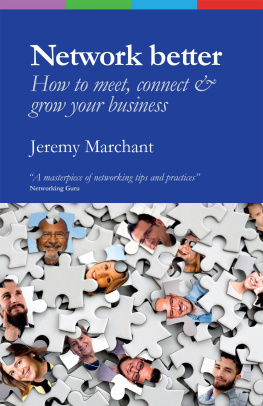


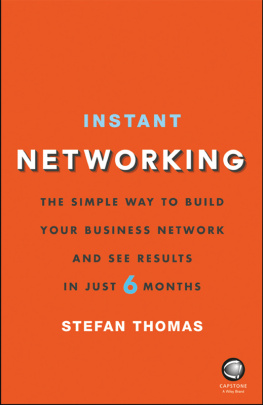
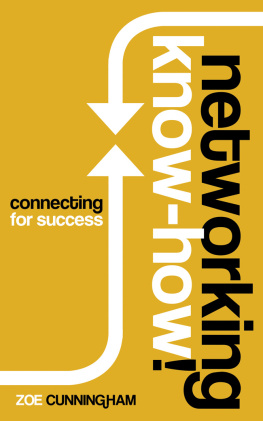

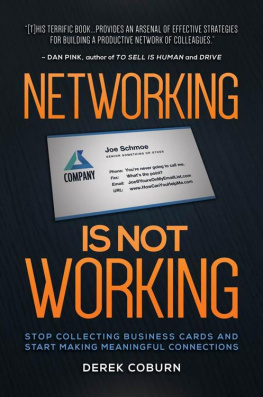

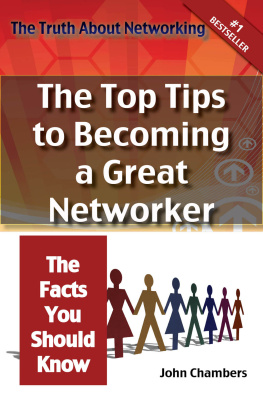
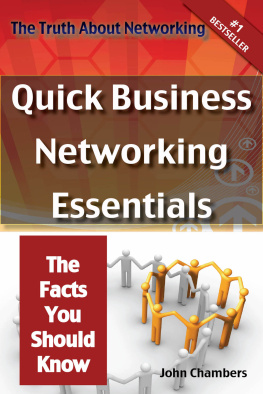

 you are networking internally in a large organisation
you are networking internally in a large organisation